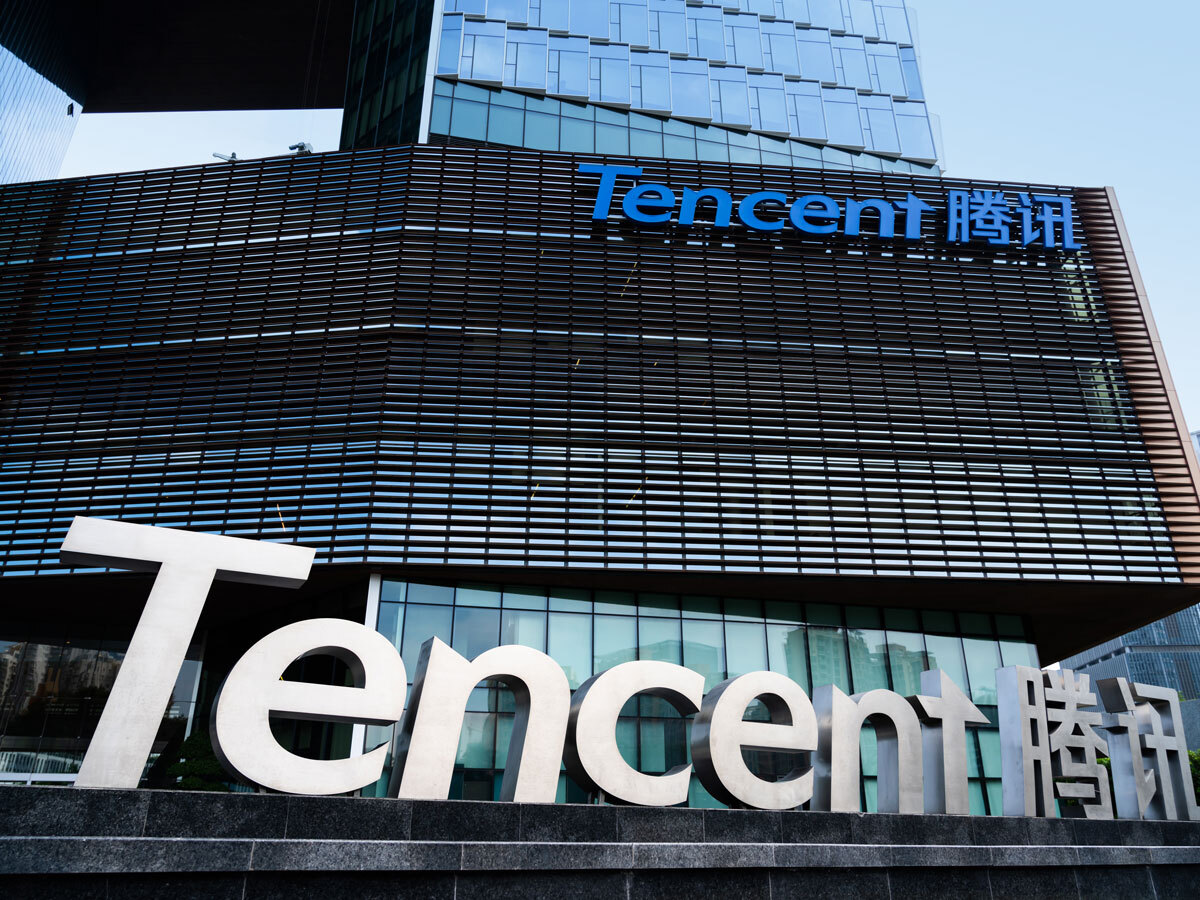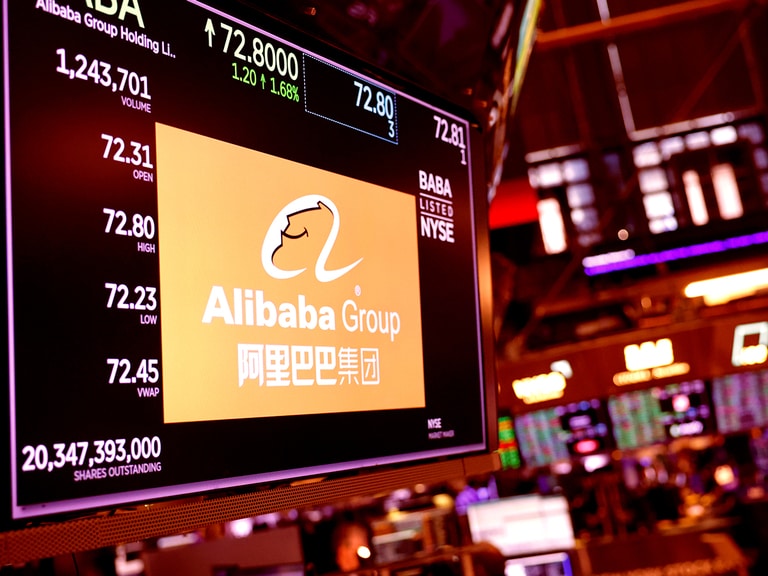Tencent is the largest company in China by market capitalisation, though its shares suffered during the government’s ‘crackdown’ on the technology sector. However, with a new release topping gaming charts, Tencent stock shows signs that it is staging a recovery.
Tencent Stock — An Introduction
As of 1 July, Tencent [TCEHY] is China’s largest company by market capitalisation. It is a diversified internet and technology company, with several noteworthy divisions and products.
Chief among these is WeChat, which is effectively China’s equivalent of WhatsApp. According to Tencent data (via Business of Apps), WeChat has over 1.3 billion annual users as of 2023.

Additionally, it develops video games, hosts cloud computing services and owns a portfolio of fintech services including WeChat Pay. In this sense, it could be considered analogous to diversified big tech companies in the US, such as Meta [META], Alphabet [GOOGL] or Microsoft [MSFT].
Tencent’s stock declined dramatically during the regulatory ‘crackdown’ that the government applied between 2020 and 2023. Between the beginning of November 2020 to the end of July 2023, roughly corresponding to the duration of the crackdown, Tencent’s share price fell 35.7%.
However, there are now signs that the company is recovering: Tencent stock gained 15% in the 12 months to 2 July.
This analysis will explore the reasons behind this recovery, and compare Tencent’s financial situation to that of two of its key peers.
Tencent’s Shares Fight Back
During its technology crackdown, the Chinese government stopped issuing new game licences. Tencent went 18 months without having a game approved, jeopardising its status as the world’s leading game developer.
Now, however, a new release could be driving Tencent’s stock upward.
Tencent’s Dungeon & Fighter Mobile (DnF Mobile), has topped China’s charts for both downloads and revenue since its 21 May release. DnF Mobile generated $270m on iOS during its first 30 days, according to reporting from Bloomberg, making it Tencent’s most successful release of 2024.
Xiao Feng Zeng, Vice President at Niko Partners, revised his estimate for the game’s gross revenue during 2024 to RMB15–18bn. In a note seen by Bloomberg, Goldman Sachs analysts Ronald Keung and Lincoln Kong wrote that “it is reasonable to conclude DnF Mobile will be China’s biggest new game launch in 2024 and Tencent’s most commercially successful new game in the past five years”.
How Has DnF Mobile Impacted Tencent Stock?
Bloomberg credits DnF Mobile’s early success for the strong recent performance of Tencent’s share price, which is up 29.3% year-to-date. It isn’t clear, however, that DnF Mobile is directly responsible; Tencent’s shares actually fell 3.1% in the month following its launch on 21 May.
It appears strong earnings may have been a major driver. On 14 May, Tencent announced that its revenue had increased 6% year-over-year to RMB159.5bn ($22.5bn), while adjusted profit attributable to shareholders increased 54% to ¥50.3bn. Tencent’s share price closed up 4.7% that day.
In its coverage of the results, the Financial Times highlighted the end of China’s crackdown on its technology sector as a factor behind renewed investor optimism in Chinese technology stocks. In Tencent’s case, the resumption of gaming licence approvals appears to have been a particular tailwind, as evidenced by the success of DnF Mobile — revenue from which will be recognised in Tencent’s next earnings release.
Comparing Tencent, Alibaba and JD.com Stock
Compared to its peers — the diversified technology platform Alibaba [BABA] and the online e-commerce platform JD.com [JD] — Tencent’s fundamentals shape up as follows:
| As of 3 July | TCEHY | BABA | JD |
| Market Cap | $456.45bn | $179.61bn | $41.01bn |
| P/S Ratio | 5.44 | 1.45 | 0.27 |
Projected Revenue Growth (Current Year) | 25.7% | -3.9% | 5.8% |
Projected Revenue Growth (Next Year) | 11.8% | 12.6% | 10.3% |
(Estimates via Yahoo Finance)
Tencent is by far the biggest company, and is also expected to register the highest revenue growth for next two financial years.
Tencent is relatively efficient at converting its revenue into profits. Over the trailing 12 months, its operating margin is 32.95%. This is more than double that of Alibaba, which has an operating margin of 13.35%, and eclipses JD.com’s, which stands at 2.96% over the same period.
Tencent Stock: The Investment Case
The Bull Case for Tencent
Tencent is a firmly established player in certain high-growth markets in China. For example, as of Q4 2023, Tencent is China’s third-largest cloud services provider, with 16% of the market, trailing Alibaba (39%) and Huawei (19%). Research firm Canalys expects the Chinese cloud infrastructure services market will grow by 18% in 2024.
The Wall Street community is also relatively bullish about Tencent. 47 analysts polled by LSEG regarding Tencent’s Hong Kong shares [0700:HK] yield a median price target of HK$464.13, 22.3% above their 3 July close of HK$379.40.
The Bear Case for Tencent
Tencent stock will, for the foreseeable future, face potential headwinds simply by virtue of being a Chinese company.
While the regulatory crackdown on technology stocks appears to be over for the time being, there is little preventing the government resuming this policy. Even if it doesn’t, the effects could be long-lasting; new antitrust laws impact the way that firms like Tencent are able to operate.
State-owned entities also took the opportunity, while share prices were depressed, to buy up “golden shares” in companies like Tencent, giving the government a direct say in how they are run, according to a May report in Time magazine.
Then there is geopolitical risk. Both major US presidential candidates have previously taken a hawkish stance towards China, with President Joe Biden having continued the trade war that Trump started in 2018. As Jens Nordvig, Co-founder and CEO of MarketReader, told OPTO Sessions in March, “One of the few things that there’s consensus about in the US is that there should be a strong posture against China”.
There are at least two ways in which US policy could hurt Tencent’s stock. Firstly, sanctions have previously restricted US-based investors buying stock in Chinese companies. Secondly, sanctions limiting the export of important technologies such as high-performance computer chips from the US to China could limit Tencent’s access to the equipment it needs to improve its products in future.
Conclusion
In short, Tencent’s stock is staging a recovery thanks to a more pro-technology stance in China. This is underscored by the recent improvement in its fundamental performance, and analysts expect that its revenue will grow relatively quickly in the coming years. However, considerable uncertainty remains, not least regarding the geopolitical landscape. Investors should conduct their own thorough research before making any investment decision.
Continue reading for FREE
- Includes free newsletter updates, unsubscribe anytime. Privacy policy






